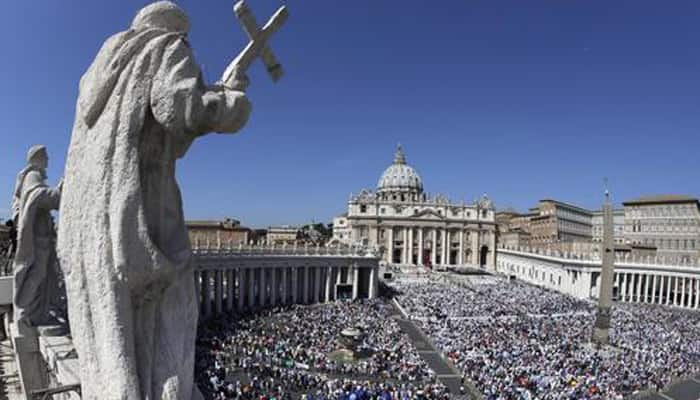Vatican City: Pope Francis on Sunday declared Mother Teresa a saint after a canonisation ceremony at Vatican City and hailed her as the personification of maternal love and a powerful advocate for the poor.
"We may have some difficulty in calling her 'Saint' Teresa. Her holiness is so near to us, so tender and so fruitful that we continue to spontaneously call her Mother. She made her voice heard before the powers of this world, so that they might recognize their guilt for the crime - the crimes! - of poverty they created," the pontiff said.
The unscripted comments came at a canonisation mass attended by 100,000 pilgrims, including 13 heads of state or government and hundreds of sari-clad nuns from Teresa's order, the Missionaries of Charity.
Queen Sofia of Spain and some 1,500 homeless people also looked on as Francis described Teresa's work in the slums of the Indian metropolis as "eloquent witness to God's closeness to the poorest of the poor."
To applause, the Pope added, "Mother Teresa loved to say, 'perhaps I don't speak their language but I can smile'. Let us carry her smile in our hearts and give it to those whom we meet along our journey, especially those who suffer."
Pope Francis also used his sermon to recall Teresa's fervent opposition to abortion, which she termed "murder by the mother" in a controversial Nobel Peace prize speech in 1979.
She "ceaselessly proclaimed that the unborn are the weakest", he said.
With the 16th century basilica of St Peter's glinting in the late summer sun, Francis led a ritual mass that has barely changed for centuries.
Speaking in Latin, he declared "blessed Teresa of Calcutta (Kolkata) to be a Saint ... Decreeing that she is to be venerated as such by the whole Church."
After the mass, the 79-year-old pontiff boarded an open-topped jeep and toured around St Peter's square and surrounding streets to a rapturous reception from tens of thousands of well-wishers.
VISUALS FROM Vatican City's St Peter's Square:


Mother Teresa's work with the poor of Kolkata made her an instantly recognisable global figure.
The sainthood ceremony came one day short of the 19th anniversary of her death, at 87, in Kolkata where she spent her adult life, first teaching, then tending to the dying poor.
It was in the latter role, at the head of her own still-active order, the Missionaries of Charity, that she became one of the most famous women on the planet.
Born to Kosovar Albanian parents in Skopje - then part of the Ottoman empire, now the capital of Macedonia - she won the 1979 Nobel peace prize and was revered around the world as a beacon for the Christian values of self-sacrifice and charity.
She was simultaneously regarded with scorn by secular critics who accused her of being more concerned with evangelism than with improving the lot of the poor.
The debate over the nun's legacy has continued after her death with researchers uncovering financial irregularities in the running of her Order and evidence mounting of patient neglect, insalubrious conditions and questionable conversions of the vulnerable in her missions.
A picture of her as someone who was just as comfortable flying around in a private plane as clutching the hand of a dying patient also emerged to counterbalance her saintly image.
By historical standards, Teresa has been fast-tracked to sainthood, thanks largely to John Paul II.
The Polish cleric was a personal friend of Teresa and as the Pope at the time of her death, he was responsible for her being beatified in 2003.
Achieving sainthood requires the Vatican to approve accounts of two miracles.
The first one, ratified in 2002, was of an Indian woman, Monica Besra, who says she recovered from ovarian cancer a year after Teresa's death - something local health officials have put down to medical advances rather than the power of prayer.
In the second, approved last year, Brazilian Marcilio Haddad Andrino says his wife's prayers to Teresa led to brain tumours disappearing. Eight years later, Andrino and his wife Fernanda were in the congregation on Sunday.
(With PTI inputs)

















